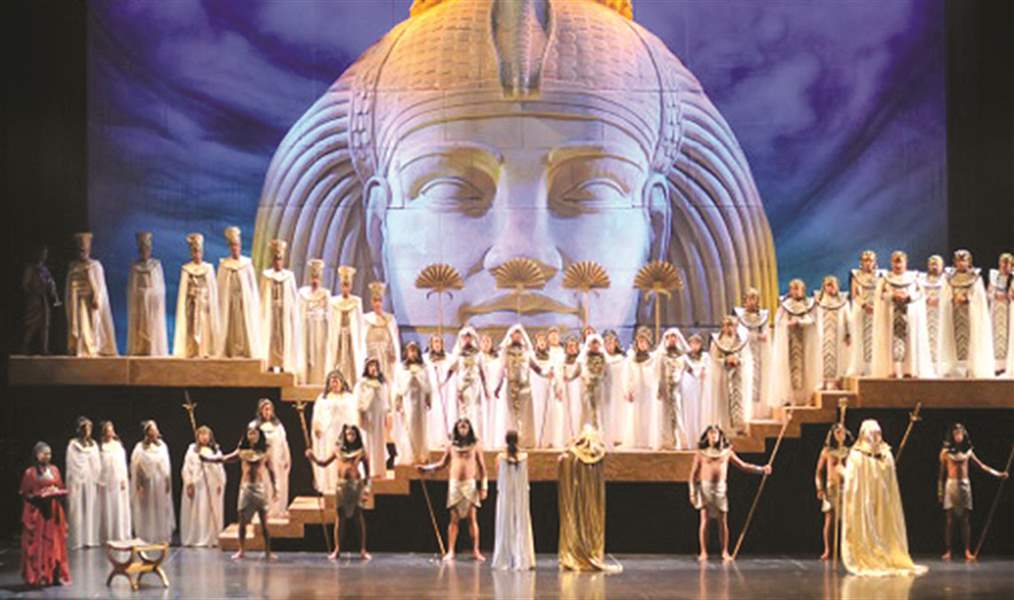
Verdi's glorious tale of 'Aida' opens 2013-2014 Toledo Opera season
9/28/2013
The story of 'Aida' is set in ancient Egypt.

The story of 'Aida' is set in ancient Egypt.
Giuseppe Verdi’s Aida, the tale of love and hate, loyalty and betrayal, honor and self-destruction set in ancient Egypt, really puts the “grand” in grand opera.
This fall, seeking a benchmark to demonstrate that it’s now fully back in business, the Toledo Opera will open its 2013-2014 season with the 1871 masterpiece next weekend. Show times are 7:30 p.m. Friday and 2 p.m. Oct. 6 at the Valentine Theatre.
With a diadem of renowned singers crowning the stage, with principal artistic director James Meena leading the Toledo Symphony in an improved pit, and with clever staging by director Brian Deedrick, this production has the potential to lift the company to a new level of artistic achievement.
Plus, it’s a fond hearkening back to the Toledo Opera’s first production in 1959. Then, two years of planning had culminated in the introduction of live opera to Toledo audiences.
Impresario Lester Freedman was backstage at the Paramount Theater while Joseph Hawthorne, music director of the Toledo Symphony, conducted in the pit. Then as now, guest artists filled principal roles and an enthusiastic chorus of local singers donned Egyptian garb to provide backup.
The local premiere sold out all 3,000 seats. It was the social event of that fall.
Today, though much has changed in the ensuing 54 years, Freedman’s words still ring true: “An opera company has a responsibility other than just staying in business. Its purpose is to broaden people’s scopes, to let them know something else exists.”
Aida is truly “something else.”
Verdi’s soaring arias and stirring choruses bring to life Auguste Mariette’s Egyptianesque plot, transformed into the eloquent libretto for Verdi by his favorite writer, Antonio Ghislanzoni.
Created in the late 1870s on a commission from the Khedive (mayor) of Cairo to dedicate a new opera house in the Egyptian capital, Aida is set in ancient Egypt. Then, as now, there were border skirmishes. Two of the four acts are set in Memphis, the others in Thebes.
Aida, daughter of Ethiopian king Amonasro, is captured by the Egyptians and enslaved to Egyptian princess Amneris. Princess and slave both love Egyptian warrior Radames. That he only cares for Aida raises Amneris’ hackles.
Post-war, when victorious Egyptians bring Amonasro back in captivity, Aida concocts an escape plan to realize all her heart’s desires: a return to Ethiopia, hers and her father’s, and union with Radames.
But what’s opera without intrigue and tragedy?
Jealous Amneris pulls palace strings and foils the plot. Radames is cast as traitor, and sentenced to live burial. Amonasro escapes, but where is Aida?
The answer will be revealed in Act IV of next weekend’s production.
The story unfolds via some of Verdi’s most urgent and memorable music, with soaring arias, impassioned duets, and powerful choral passages that live on in the general imagination after the applause ends.
To Meena, Aida represents Verdi at his finest.
“Aida is right at the middle of Verdi’s development and bridges his early works (Rigoletto, Nabucco, Il Trovatore) and his more mature creations (Otello, Simone Bocanegra, Falstaff), said Meena.
He has produced the big piece, assembling a star-studded cast.

Othalie Graham sings the role of Aida.
Among singers making Toledo debuts will be soprano Othalie Graham (Aida), tenor Antonello Palombi (Radames), mezzo Irina Mishura (Amneris), and baritone Mark Rucker (Amonasro).
Graham, tall and gorgeous and witty, floated so many high Bs during a recent rehearsal it seemed as if her feet might leave the floor of the Valentine’s big fifth floor rehearsal space.
Known for Wagnerian portrayals, the Toronto native also has sung Strauss, Beethoven, Gershwin, and other composers on stages stretching around the globe.
She is particularly excited to be working with conductor Xian Zhang and the Giuseppe Verdi Symphony Orchestra of Milan in a concert next year. (Xian Zhang is the first woman ever appointed to lead an orchestra in Italy.)
By contrast, playing her nemesis, Amneris, a Russian mezzo, conveys an earthy, direct, and richly colored menace. Mishura has been singing at the Metropolitan Opera since 2000 and is in demand on major opera stages here and abroad.
Palombi, whose Italian roots show in his brilliant, big, and agile tenor, debuted at La Scala in Milan as Radames in 2006. Not only is the voice capable of thrilling emotion, Palombi’s acting and energy should reach out to convince the audience in the highest seats.
American baritone Rucker made his Met debut as Amonasro and has established himself around the world as a notable Verdi interpreter. He has sung at Carnegie Hall, the Concertgebouw, Vienna’s Statsoper, and Michigan Opera Theatre.
Also with roles in this production are Chinese bass-baritone Sun Yun, Sean Cooper, from Bowling Green State University, and Jennifer Cresswell, of the Toledo Opera.
Linking today’s Toledo Opera with its past is that, like Freedman, who took Toledo productions to Dayton, Meena will transport this Aida to Charlotte, where he’s artistic director of Opera Carolina.
Collaboration, says Meena, is essential to ensure the highest quality production. Since moving to Charlotte in 1999, he has reached out to other cities desiring opera.
Collaboration means a multiplier effect for each rehearsal, saving time and energy, sharing the wealth. It also spreads costs — a production like Aida runs into six figures — by working better deals for sets, costumes, and artists.
“We partner with Edmonton,” added Meena, mentioning the Alberta city noted for its active arts scene.
Indeed, the stunning sets originated in Brazil, stopped off in Baltimore, traveled to Quebec, then were used in Edmonton last year. After their Toledo run, sets and costumes will move to Charlotte. Opera Carolina has purchased them and will continue to make money by renting them to other opera companies.
There is one other way that the original Toledo Aida differs from this year’s: ticket price. A fine seat in the Paramount, then Toledo’s premier showcase venue, could be bought for $4.50; the best seats cost $15.
Next week’s production, for which tickets are selling briskly, costs a bit more, from $30 to $75. (Student rush and senior citizen tickets are discounted.) They can be purchased at www.toledoopera.org or 419-255-7464.
But if that seems steep, remember, total cost for the 1959 production was $500.
Contact Sally Vallongo at: svallongo@theblade.com.